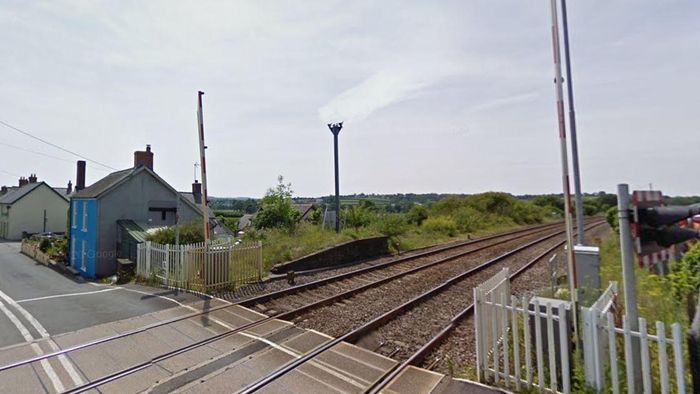Top News
Kurtz criticises ‘deeply disappointing’ delays at St Clears railway station

Samuel Kurtz MS has voiced his disappointment at the lack of progress by both the UK and Welsh Governments in delivering the reopening of St Clears railway station.
“Despite £4.7 million awarded by the previous UK Conservative Government to the Welsh Labour Government through the Restoring Your Railway Fund, four years have passed without any visible action towards the station’s reopening,” he said.
The new UK Government Rail Minister – Lord Peter Hendy of Richmond Hill – has confirmed that the Welsh Government has acknowledged it cannot proceed with the project, citing rising costs and uncertainty over the location of a proposed new hospital in the area. The original agreed plan to reopen the station had no links to the potential new hospital.
Commenting on the situation, Samuel Kurtz, Member of the Senedd for Carmarthen West and South Pembrokeshire, continued:
“It’s deeply disappointing that St Clears railway station remains closed. The Welsh Government received funding specifically for this project, yet no progress has been made.
“Linking this delay to the ongoing uncertainty around the location of a new hospital is simply not acceptable. The location of the new hospital was never conditional on the reopen of the station’s original business case or vice versa.
“The calls for the railway station have come from the community. It’s about time that the Labour governments on either side of the M4 start delivering for rural communities like ours. ”
In a letter to Sam Kurtz, the Minister of State for Rail said that the future reopening of St Clears Station ‘remains a priority for the Wales Rail Board’.
He stressed that the Board will continue to advise the UK and Welsh Governments on options for its future progression.
Local Government
Pension divestment debate triggered but council date still unconfirmed

Gaza-linked petition passes 500 signatures threshold as Pembrokeshire meeting awaited
A PETITION calling for Pembrokeshire’s public sector pension fund to divest from companies linked to Israel has passed the signature threshold required to trigger a formal council debate – but no meeting date has yet been confirmed.
The e-petition, hosted through Pembrokeshire County Council’s own system, urges the authority to press the Dyfed Pension Fund to withdraw investments from firms alleged to be “complicit with Israel’s genocide of Gaza”.
Under the council’s petitions scheme, any submission receiving more than 500 signatures must be considered by councillors at a future full council meeting.
However, at the time of publication, the item does not yet appear on the council’s online agendas and minutes portal and no specific date has been scheduled for debate.
Agendas are typically published around a week before meetings take place.
Supporters of the proposal say the move is about ethical investing and ensuring public money is not linked to conflict or alleged human rights abuses.
One campaign supporter said: “Residents don’t want their pensions invested in companies that profit from war. Councils already take ethical positions on fossil fuels and arms manufacturing – this is the same principle.”
But others argue that foreign policy issues fall outside local government’s remit and warn the move could affect pension performance.
Sharon Ross, a freelance writer who contacted The Herald ahead of the debate, said councillors should focus on local services instead.
She said: “Local issues where councillors can make a real difference – roads, schools, GP access and business support – risk being pushed aside for international politics.
“Divesting from an entire country could reduce diversification and potentially lower returns for pension holders without achieving meaningful change overseas.”
Local government pension schemes operate under fiduciary duties requiring investments to prioritise members’ financial interests. Previous legal guidance to councils across the UK has stressed that decisions must be based primarily on financial considerations.
The Herald has asked the council to confirm when the petition will be scheduled, what proportion of the pension fund might be affected, and what financial or legal advice members will receive.
Residents can monitor the authority’s “Agenda, Minutes and Decisions” webpage for the publication of the next Full Council agenda, where the item is expected to appear once formally listed.
Further updates will follow when a date is confirmed.
Crime
Shoplifting down in Wales on paper – but local retailers say reality feels different

Police figures show recorded thefts falling locally, while shopkeepers and former offender describe ‘daily’ losses and low reporting rates
POLICE statistics suggest shoplifting is falling across Wales – but retailers in Pembrokeshire have told The Herald the problem remains persistent, under-reported and, in some cases, worse than ever.
Figures from the Office for National Statistics show a 10% decrease in police-recorded shoplifting across Wales in the year to September. In the Dyfed-Powys Police area, which covers Pembrokeshire, recorded offences fell by 20%.
The numbers were welcomed this week by retail union Usdaw, which said the drop offered “hope” that government action on retail crime was starting to have an effect.
However, several local traders said the official figures do not reflect what they are seeing on the ground.
One Milford Haven shopkeeper, who asked not to be named, told The Herald: “We don’t always report it now. You’d spend half your day on the phone. Sometimes it’s easier just to write it off. But it’s happening all the time.”
Another said theft had become “a daily nuisance”, adding that repeat offenders often returned within days.

Under-reporting concerns
The gap between statistics and experience may be explained by the way crimes are recorded.
Police figures only count incidents that are reported and logged. Retailers say many low-value thefts go unreported due to time pressures, lack of confidence that action will follow, and the administrative burden of statements and CCTV downloads.
Usdaw’s own survey of nearly 9,500 shop workers found that more than three-quarters had experienced verbal abuse, while over half had been threatened – with many incidents linked to theft.
Former offender speaks out
The Herald also spoke to a man from Milford Haven who was recently released from prison after serving time for repeated theft offences.
He said he had spent more than two years funding a drug habit by shoplifting across Pembrokeshire and in Cardiff.
According to his account, it was possible to steal goods worth up to £1,000 a day and sell them on, and he was “rarely stopped”.
“Most of the time you just walk out,” he claimed. “Even if staff catch you, they don’t always call police. It’s not worth their time.”
He said he had been detained around 50 times during what he described as hundreds of incidents, but only about ten led to police involvement and just four resulted in court.
While his experience is anecdotal, it echoes the frustrations voiced by local businesses who believe many thefts never make it into official statistics.
Government crackdown
The issue has also been raised in Parliament.
Pembrokeshire MP Henry Tufnell has previously said he has spoken to local shop owners about the impact of retail crime and has welcomed government measures aimed at strengthening enforcement.
Labour has pledged tougher action on shoplifting, including ending the widely criticised £200 threshold that many retailers felt led to low-value thefts being deprioritised, alongside promises of more visible neighbourhood policing.
Retailers say any extra support would be welcome – but many believe rebuilding confidence that crimes will be taken seriously is key.
As one trader put it: “The stats might say it’s down. But if you’re running a small shop and losing stock every week, it doesn’t feel like it.”
Community
Princess of Wales praised for ‘skill’ during local wool mill and factory visit

Royal tour shines spotlight on west Wales textile heritage and local jobs
CATHERINE, Princess of Wales was told “she’s got the skill” after trying her hand at traditional textile work during a visit to west Wales on Tuesday (Feb 3).
The royal spent the day meeting staff and apprentices at two well-known manufacturers – Melin Tregwynt in Pembrokeshire and Hiut Denim in Cardigan – highlighting the region’s long-standing reputation for craftsmanship and small-scale, high-quality production.
Stitching and mending at historic mill

At Melin Tregwynt, a family-run woollen mill that now operates as an employee-owned trust, the princess was guided through each stage of production, from weaving to finishing.
In the quality control room she was invited to mend a blanket using a needle and thread, carefully repairing the fabric under the watchful eye of experienced staff.
Paula Harding, who has worked at the mill for more than a decade, praised her technique, saying: “She did it right – and she didn’t go through the other side. That’s skill. She’s got the skill.”
Laughing, the princess told workers: “You make it look so easy,” adding that the craft was clearly “a labour of love”.
She asked questions about the history of the business, which has produced Welsh-designed blankets and throws for more than a century, and spoke with several generations of the same families who have worked at the mill.
‘Made in Wales’ denim

Later, the princess travelled to Hiut Denim, the Cardigan-based firm credited with bringing jeans manufacturing back to the town after large factories closed in the early 2000s.
The company now focuses on small-batch, premium denim and employs skilled cutters and machinists locally.
During a tour of the factory floor, the princess tried cutting out a pair of jeans and helped stitch a “Made in Wales” label onto a finished pair that staff said would be presented to the Prince of Wales.
“He will love those,” she replied.
She joked that there was “no pressure” when handed the cutting tools and said she enjoys making clothes herself, admitting the most adventurous project she had attempted was sewing a pair of pyjamas.
The royal also stopped to greet Barney, the factory’s English cocker spaniel, drawing smiles from staff.
Meeting well-wishers

Crowds gathered outside both sites to catch a glimpse of the visitor, with the princess spending time chatting with families and children before moving on.
The visit forms part of ongoing efforts by the royal household to showcase traditional industries and skilled manufacturing across the UK, with west Wales’ textile sector recognised as a key part of the region’s heritage and economy.
For workers at both businesses, the message was simple: the spotlight on locally made products and homegrown skills was just as important as the royal presence itself.

-

 Health6 days ago
Health6 days agoConsultation reveals lack of public trust in health board
-

 News7 days ago
News7 days agoCaldey still unsafe, survivors warn — despite Abbey’s reform claims
-

 Community6 days ago
Community6 days agoPembrokeshire students speak at national Holocaust Memorial Day event
-

 News15 hours ago
News15 hours agoPrincess of Wales visits historic Pembrokeshire woollen mill
-

 News7 days ago
News7 days agoKurtz raises Gumfreston flooding in the Senedd as petition deadline nears
-

 Crime4 days ago
Crime4 days agoPembroke man accused of child sex offences sent to Swansea Crown Court
-

 Education6 days ago
Education6 days ago‘Vulnerable teen’ questioned by police at Milford Haven School
-

 Education6 days ago
Education6 days agoAttendance concerns at Milford School reflect wider issue raised at the Senedd





























